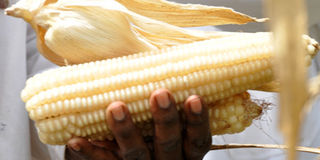Uganda’s export receipts to Kenya rise to Shs175b - BoU

Export. A man harvests maize. Kenya is Uganda’s biggest maize export. Photo/FILE
What you need to know:
In a statement released in early December, manufacturers, also expressed frustration over government’s “inability” to resolve the unfair trade practices subjected to Uganda by Kenya in disregard to the EAC common market commitments”, noting the statement was a culmination of untold frustration by government in the pursuit of equity from EAC partner states.
Uganda’s exports to her biggest neighbouring market Kenya are showing signs of recovery after months on slugging.
The never ending trade wars between the two countries negatively impacted on export receipts which have been declining for more than a year and half.
However, the last three monthly reports from Bank of Uganda show signs of recovery, with the latest released figures for November last year, indicating a 9 per cent increase in Uganda’s exports receipts to Kenya.
The report shows: “In November, Uganda’s export receipts to Kenya climbed to $57.5m (Shs194b), up from $47.4m (Shs175b) earned the previous month of October.”
This was higher than the $42.1m (Shs155b) realised in September.
Some goods which Uganda exports to Kenya include agricultural products such as maize, milk, sugar, fruits, eggs, beans and other manufactured goods in the fast moving consumables.
These goods, according to Kenya, have created a stiff competition with the locally produced products because of their low prices.
Trade war
In trying to regain their market, Kenya waged a trade war which saw several exports from Uganda blocked.
This prompted manufacturers through their umbrella organisation – Uganda Manufacturers’Association (UMA) - petition government at the end of last year.
In a statement released in early December, manufacturers, also expressed frustration over government’s “inability” to resolve the unfair trade practices subjected to Uganda by Kenya in disregard to the EAC common market commitments”, noting the statement was a culmination of untold frustration by government in the pursuit of equity from EAC partner states.
Mr Daniel Birungi, the UMA executive director, said it was unfair that Uganda continues to play second fiddle and acts as a “supermarket” for other countries yet its products are blocked from entering the same countries that benefit from its market.




